#Sociology notes download
Explore tagged Tumblr posts
Text
#Sociology optional notes#Sociology optional books#Upsc sociology optional question paper#Sociology notes download#Sociology for upsc#Best sociology teacher#Best sociology coaching
0 notes
Text
i don't even know if i WANT to finish nursing at this point, like i fucking hate college rn and it's only an associates program but like. please i am so tired professors let me fucking sleep
#i have sociology discussion post and quiz to do along w notes to finish#nursing test and i have to set up the new laptop AND figure out the old login for the exam thing to download#spanish is actually my favorite rn and making me wanna go into linguistics but ¯\_ (ツ)_/¯#i know that class'll start being REAL fucking busy later#and clinical starts next week and my sister told me the hospital we're going to normally has bedbugs#and i'd fucking die if i got bedbugs. that is a level of physical and mental torture i couldn't endure#hate bugs hate parasites hate that shit touching me hate the potential of my bed/sheets/weighted blanket being ruined#this isn't me judging anyone w bedbugs btw. just saying because i don't want this taken out of context#the idea of having parasitic bugs crawling on me would set me off so bad it'd be like fucking high school again. i just know my limits#but also back to school lol i was supposed to do my sociology stuff last night and i tried to lay down for 20 minutes#fell asleep for 4 hours and slept through dinner. i am hungry :(#and now i have to stay up to do it instead#PLUS I HAVE A HUGE NURSING PROJECT DUE NEXT WEEK THAT IS EXPECTED TO TAKE 6 H O U R S#and i still have to do journal entries for ballet#at least my contacts fucking keep me from falling asleep on campus because i get so freaked about eye infection potential#BUT i also did pass my injection eval! ya girl can now inject im medication in a clinical setting
2 notes
·
View notes
Text
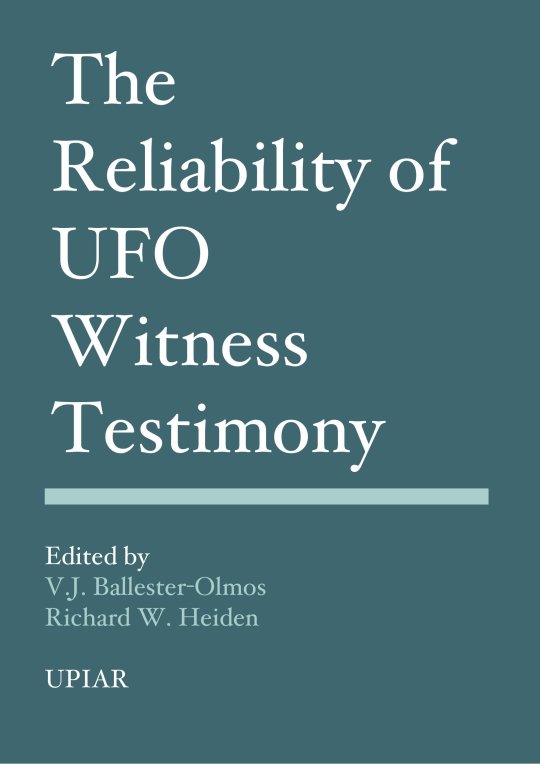
Book Release: The Reliability of UFO Witness Testimony (With a Chapter by Cláudio Tsuyoshi Suenaga)
V.J. Ballester-Olmos & Richard W. Heiden (Eds.)
For 76 years, casual observers around the world have reported sightings of aerial phenomena unexplainable to them. More elaborate personal experiences have been reported by others whose testimony speak of close interactions with fantastic flying machines that land, from which strange beings descend, and even kidnap the onlookers. In the absence of compelling physical evidence of the reality of these narrations, how should science study immaterial observations and test these claims? The very standard of reputable witness reliability is at stake here.
The Reliability of UFO Witness Testimony is the first major book to comprehensively focus on the discussion and current views on problems and challenges posed by the reliability of UFO testimonies. This is a cross-disciplinary compendium of papers by 60 authors from 14 different countries. They are specialists in social, physical, and biological sciences, including psychology (predominantly) as well as psychiatry, sociology, anthropology, history, philosophy, folklore, religion, journalism, engineering, computing, medicine, education, analysts with experience in the critical study of UFO perceivers, and other professionals. This volume shares thematically convergent ideas about the plausibility of alternate explanations for an alleged close-range UFO phenomenon.
The 57 chapters in this book are divided into seven section headings: Case Studies, Psychological Perspectives, On Witness Testimony, Empirical Research, Anthropological Approach, Metrics and Scaling, and Epistemological Issues. There, the subject matter is analyzed from statistical work to clinical assessment, psychometrics, comparative and evaluation inquiry, and other topic perspectives.
Some extracts from the Foreword, written by Dr. Leonard S. Newman, Professor of Psychology at Syracuse University:
"The contributors to this book include some very smart people. There are all sorts of issues to which they could be devoting their intellectual energy, and all sorts of scholarly and research contributions they could make. They don’t have to write thoughtful and rigorous chapters for a book called The Reliability of UFO Witness Testimony, but this is what they have done. And so, the work continues, as attested to by the papers in this volume. I’m not sure if there exists any collection of papers on any topic that can claim to comprehensively summarize everything that is currently known about it. But this one comes pretty close."
This 711-page book has been released online in the Academia.edu portal, from where it can be downloaded for free:
Simultaneously, UPIAR Publishing House (Turin, Italy) has published two softcover, A4 format print editions, one in black & white, another in full color (ISBN: 9791281441002). The book can be purchased through this link:
Four outstanding academics have provided praise notes to this volume. This is what they said:
Elizabeth Loftus, Ph.D., Distinguished Professor of Psychology at the University of California, Irvine, USA:
"When ordinary citizens claim to have extraterrestrial encounters, such as seeing UFOs or meeting with alien beings, what should we think? Did the alien abduction really happen or was it a hoax? Is someone deliberately lying? Are they false memories? Readers will be enthralled by the fascinating case histories that are presented in The Reliability of UFO Witness Testimony*, a volume where sixty experts examine these issues with depth and insight. These cases teach us a great deal about how humans come to believe they have experienced bizarre events that may have never occurred at all."
Steven Jay Lynn, Ph.D., Distinguished Professor of Psychology, Binghamton University (SUNY), USA:
"This captivating book will appeal to anyone interested in UFOs (and who isn’t?), the vagaries of memory, eyewitness perception and misperception, critical analysis of puzzling phenomena, and evaluating scientific vs. pseudoscientific claims. This volume ranks in the elite category of essential reading for students, scientists, and the seriously curious among us, and therefore has my highest recommendation. Bravo!"
Henry Otgaar, Ph.D., Professor of Legal Psychology, Maastricht University, the Netherlands, and Leuven Catholic University, Belgium:
"Claims of UFO sightings and experiences continue to fascinate us. This book has collected a unique and diverse set of case studies and critical articles on how such experiences unfold and what the authenticity of these claims is. The collection of these different articles is truly groundbreaking and is the first-ever complete assemblage concerning the validity of UFO testimony."
Benjamin E. Zeller, Ph.D., Professor and Chair of Religion, Lake Forest College, Illinois, USA:
"In referring to extraterrestrial contact, Carl Sagan said that extraordinary claims require extraordinary evidence. This fine book seeks to contextualize what such evidence entails. Its contributors analyze UFO sightings and cases both famous and obscure, recent and historical, and quite international in scope. They draw from an impressive range of methodological, academic, and scientific perspectives, and consider such topics as the nature of cognition, memory, types of belief and testimony, psychology, and the rationality of belief. Skeptics, believers, and scholars of ufology will all find this book fascinating!"
For additional information please contact:
UPIAR Publisher: [email protected]
Editor: V.J. Ballester-Olmos, [email protected]

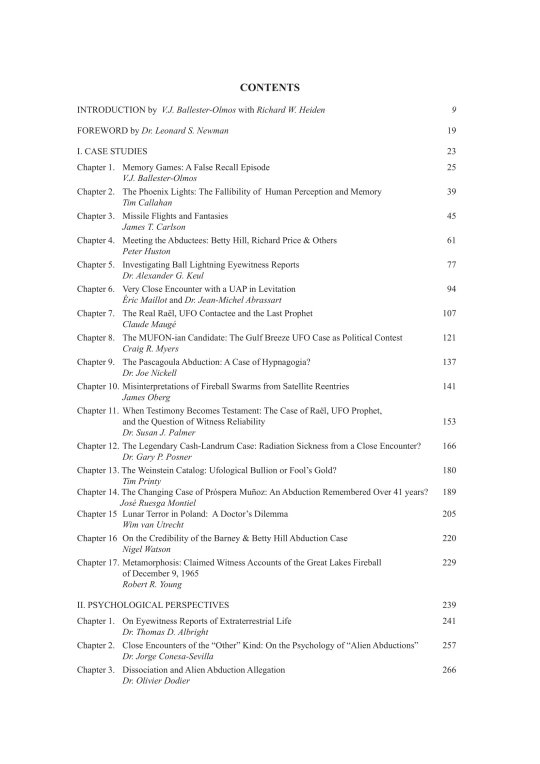
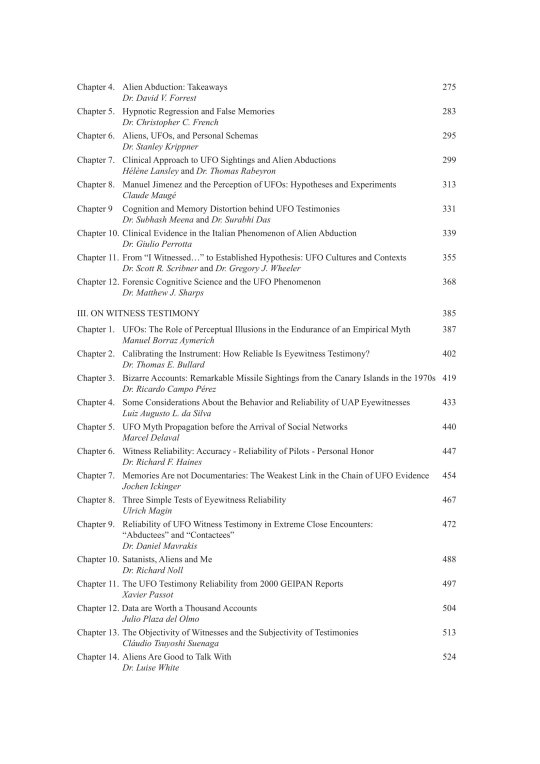
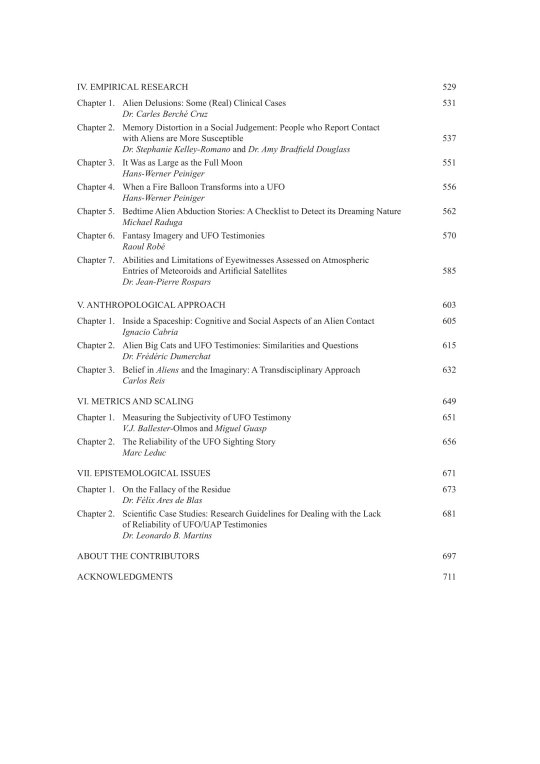
The Objectivity of Witnesses and the Subjectivity of Testemonies
Cláudio Tsuyoshi Suenaga
I had the honor of being one of the select few invited by the distinguished Vicente-Juan Ballester Olmos, one of the organizers and editors of this impressive scientific-academic book, together with the equally distinguished Richard W. Heiden, to write a paper on the "reliability of the testimony of witnesses of UFOs", a crucial aspect of ufological research, since, in the absence of material evidence of the phenomenon, this is the primary source we deal with, the "raw material", so to speak, to permeate our analyses, even more so for those who not only deals with "second-hand" reports, but gathers them directly from the witnesses themselves, in sometimes harsh and hostile field conditions.
In my contribution entitled "The Objectivity of Witnesses and the Subjectivity of Testimonies", I carried out a critical analysis of the general reference base of the UFO problem, the testimony, seen as a cultural source authentic and indisputable, but which presents serious distortions. One of the main points questioned by me was the exact value of the testimonies, which form the basis of the reports and, therefore, of the UFO phenomenon. I tried to give an adequate scientific treatment to these data and factors relegated to the background by ufologists: the subjective observational parameters, the perceptive aspects, the language and the historical-cultural context of the witness and the psychosociological variables, that is, everything that was disparagingly called "background noise", the "sociological reject" despised in detriment of the "signal".

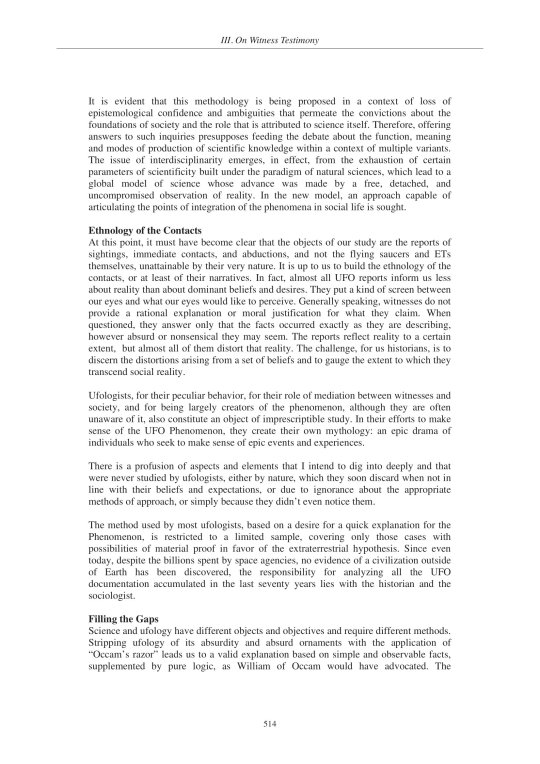
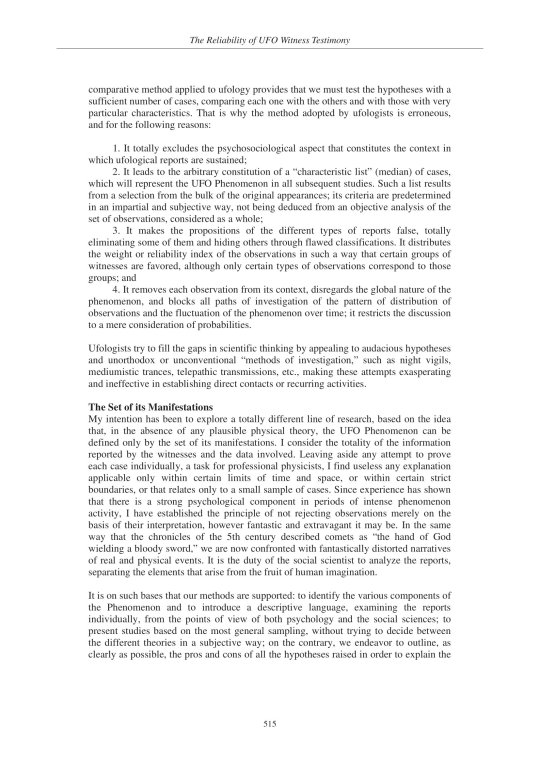
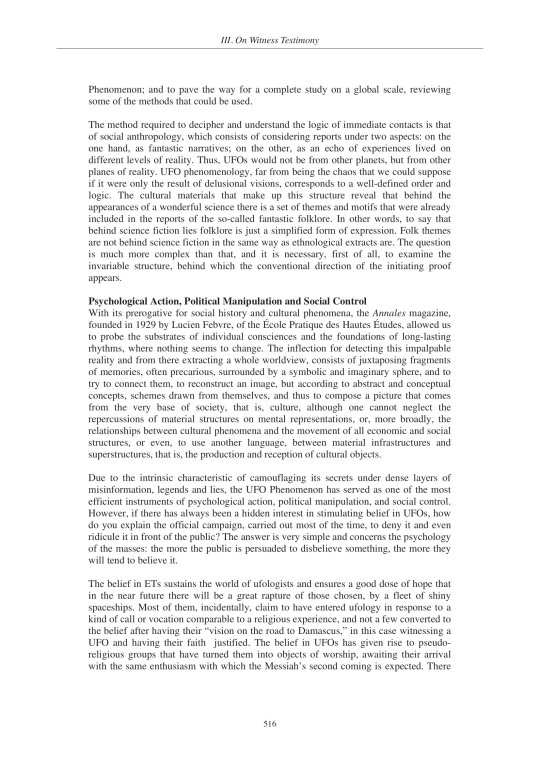
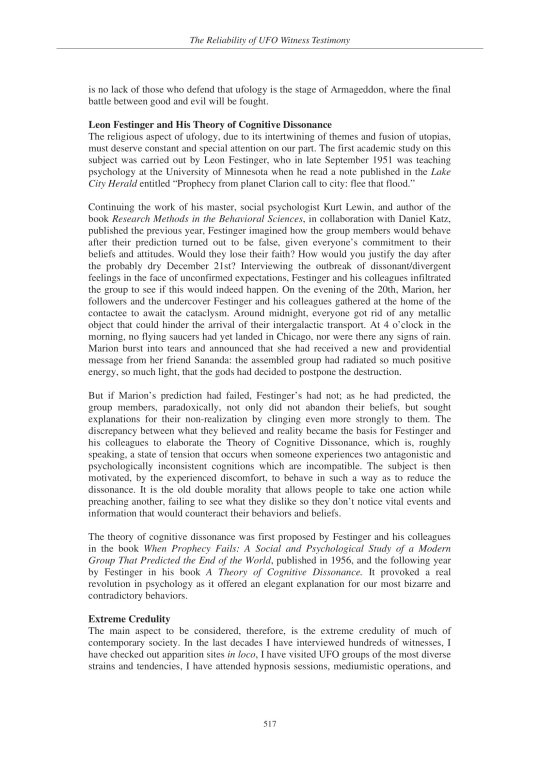
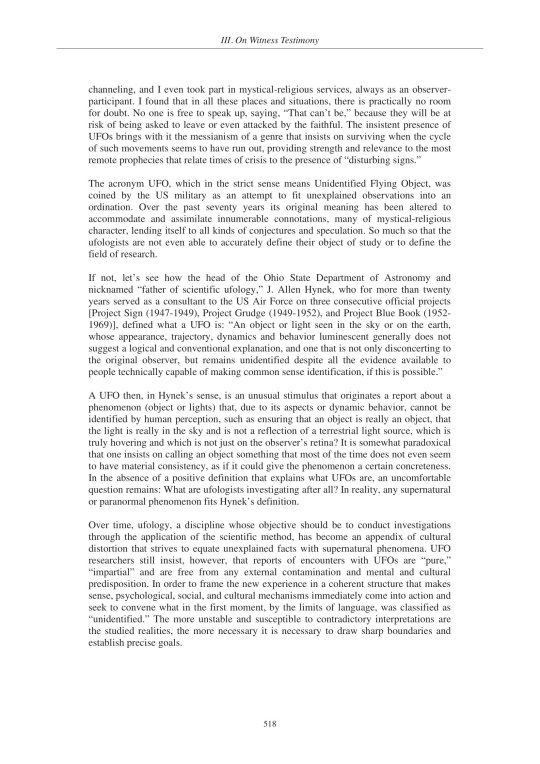
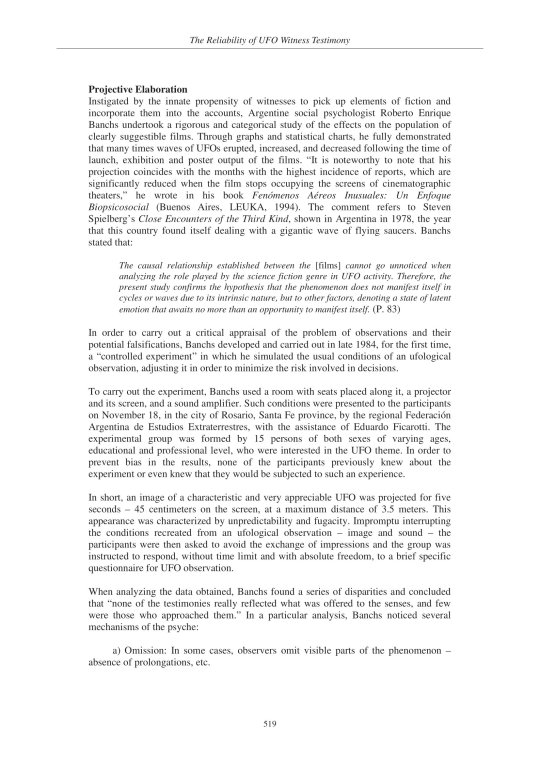
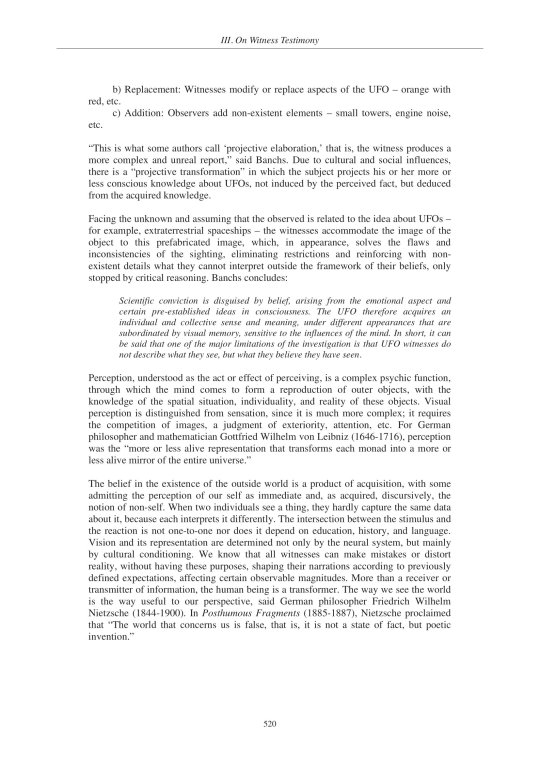
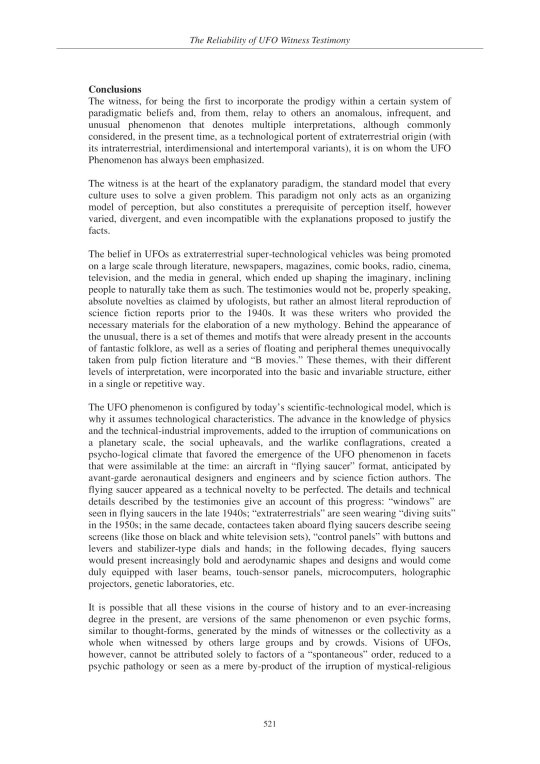

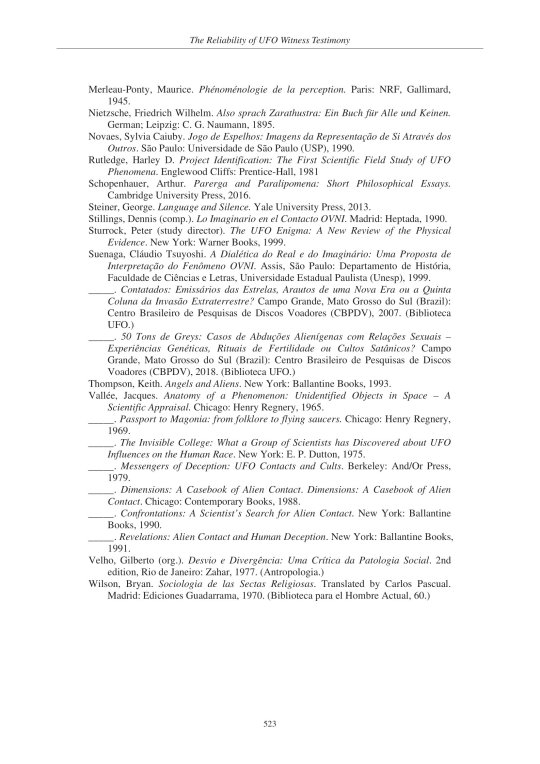
Consult and keep close at hand, therefore, this, the first major book to comprehensively focus on the discussion and current views on problems and challenges posed by the reliability of UFO testimonies. A cross-disciplinary compendium of papers by 60 authors from 14 different countries.
(large format, 711 pages)
You can download the full 711-page book on my Patreon:
#ufologia#ufos#ufo phenomenon#ufo sightings#ovnis#extraterrestres#história#aliens and ufos#antropologia#sociology#historia#psicologia#religião#testemunho#livro#classic academia#books and libraries#science#skepticism#ceticismo#testimony#the witness#suenaga yoroshiku onegaishimasu
29 notes
·
View notes
Note
hello! im a french person whose mother is a white afrikaner, and i was just in south africa and visited the western cape. i do not speak afrikaans but visited the taal afrikaans monument and museum, which had a lot of interesting stuff about muslim slaves in the cape and their influence on afrikaans' development as a language, as well as the fact that the first written afrikaans texts were in fact in arabic script. if it doesnt bother you too much, do you know of any good english-language books or articles on the subject? im now really interested in learning more. thank you so much and have a wonderful day!
I actually have an unfinished post about this very topic, which has been in my drafts since 2019. which is a bit embarrassing
research into the rôle of brown people (the slaves, Cape Malays, as well as the Khoekhoe and San/Bushmen) in the history of Afrikaans has only really taken off since the 1990s, which is pretty recent, so there's not a lot published yet (there was some work done before the 90s, but as it didn't conform to the apartheid regime's narrative it wasn't mainstream or widely published). and of course, unsurprisingly, most of the research being done is in Afrikaans
luckily, perhaps The Best source on the topic is in English ! "The Afrikaans of the Cape Muslims from 1815 to 1915" by Achmat Davids (eds. Hein Willemse & Suleman E Dangor) published posthumously by Protea in 2011. this is a fantastic book. it focuses specifically on the Afrikaans of the Cape Malays (descendants of the slaves brought to the Cape) and on Afrikaans written in (a modified) Arabic script, a practice also called Jawi. It also gives an overview of like all the research which had been done up to that point which is great. this is absolutely the first text to read if you're doing research on this subject
the trouble is, this book is out of print and I've been unable to source a copy for the last 8 years. my uni library had a copy so I have read the book and can recommend it, but just note that a library is probably your best bet to find it
the book is based on Davids' 1991 MA thesis, which is archived on the University of the Western Cape website. the thesis is like 300 pages long, so full of information and definitely worth consulting if you can't find the book. I'd then suggest looking for any English citations in his bibliography if you still want to read more
Davids also wrote a couple of shorter articles and essays, which you should be able to find online or through google scholar/jstor etc. if you can't, lmk I may still have them downloaded on an old harddrive somewhere.
there is also a more recent collection of articles which focuses on the contributions of brown folks in general to the development of Afrikaans, and also includes sociological discussion, not just linguistic. I was so certain that there was an English translation. but I can only find reference to the Afrikaans edition online. I've decided to mention it anyway in case other folks who can read Afrikaans find this post. the books is "Ons kom van vêr: Bydraes oor bruin Afrikaanssprekendes se rol in die ontwikkeling van Afrikaans" edited by WAM Carstens & Michael le Cordeur, published by Naledi in 2016.
36 notes
·
View notes
Text
Su di me🌟
Laura, 20 anni (she/her)
Vengo dal lago di Garda, in provincia di Verona
Studio sociologia a Trento
Non mi piace mettermi etichette (mi sembra inutile dato che sto crescendo e mi sto riscoprendo)
Interessi: Leggo, tengo un diario, guardo un sacco di film e serie, adoro il mio percorso di studi e mi piace studiare
Persone: Sono in una relazione (etero, monogama) molto felice da due anni, ho poche amicizie strette e un buon rapporto con la mia famiglia. In questa fase della mia vita valuto moltissimo tutte le mie relazioni, ritengo che tutti abbiano bisogno di compagnia e amore per stare bene
Altre cose random: Sono ossessionata con le candele e con i post-it. Non esco molto spesso la sera ma quando lo faccio preferisco musica tecno o ambienti queer. Mi diverto a cucinare
Le foto che pubblico sono prese dalla mia galleria, non mi piace scaricarle da internet
english translation ⬇️
About me🌟
Laura, 20 years old (she/her)
I'm from the Garda lake, Verona
I'm a sociology student in Trento
I don't like to label myself since I'm growing and changing a lot
Hobbies: reading, journaling, watching movies and TV shows, studying
People in my life: I'm in a hetero monogamous long-term relationship, got a few close friends and a good relatioship with my family. I value my relationships since I think love is required to be happy
Other random things: I'm obsessed with candles and sticky notes. I don't go out at night very often, but when I do I prefer techno music and queer environments. I love cooking
All the pictures I post on tumblr are taken by me, I don't like to download them from the internet
6 notes
·
View notes
Text
'Download Rare Documents, Manuscripts, Books & Newspapers on the history of Palestine, Egypt, Lebanon, Turkey & the Ottoman Empire' - Palestine Nexus
Source: This link leads to the 'Sources' page within the 'Palestine Nexus'. The page itself contains brief information of a variety of written documents from Palestine, Egypt, Lebanon, Turkey and the Ottoman Empire. There are links within the page that lead to a google drive containing the mentioned documents. Some of the links contain the uploader's notes on the document. All of them appear to be compiled and uploaded by Zachary J. Foster, a historian and graduate from the University of Michigan (B.A., Sociology and Political Science, 2007), Georgetown University (M.A., Arab Studies, 2011), and Princeton University (Ph.D., Near Eastern Studies, 2017) Additional information: The Palestine Nexus is a website dedicated to providing information about Palestine. It links to their newsletter and podcast, 'Palestine, in your Inbox', the aforementioned 'Sources' page with the google drive documents along with a 'Maps' page that include historical maps on the middle east, and their online courses on Palestine and Israel. It is run by Zachary J Foster, Stephanie Alexandra (coordinator and music producer), and Alexandria Shaw (video editor).
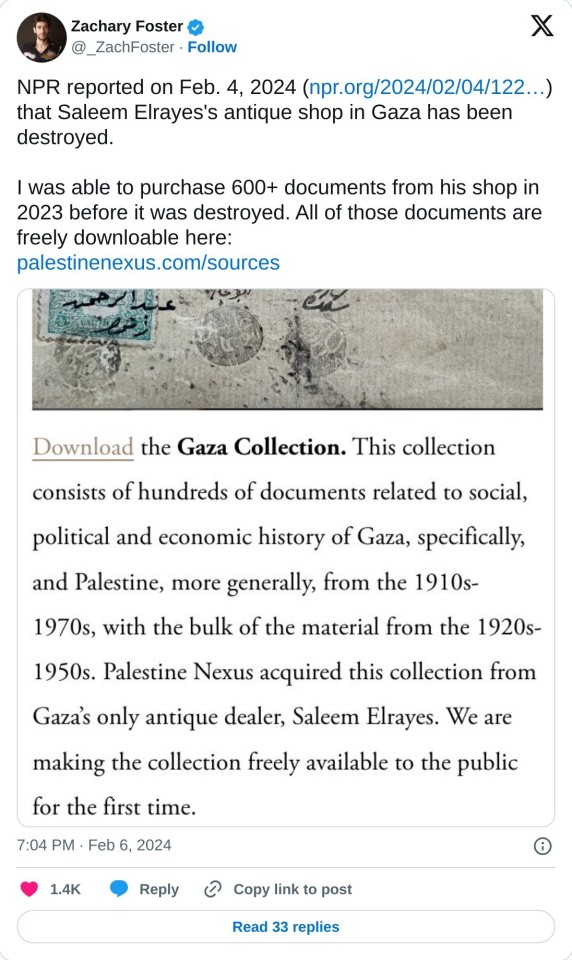

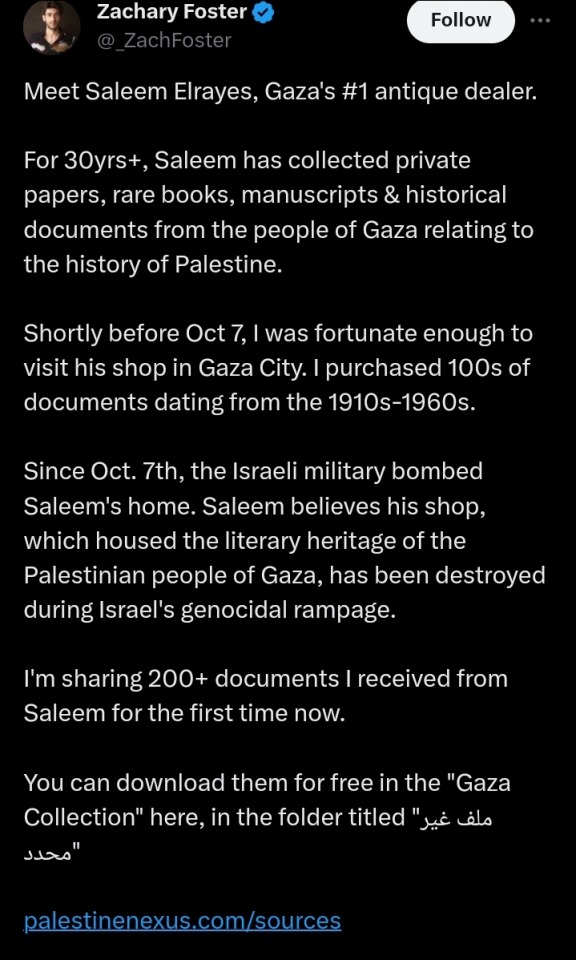
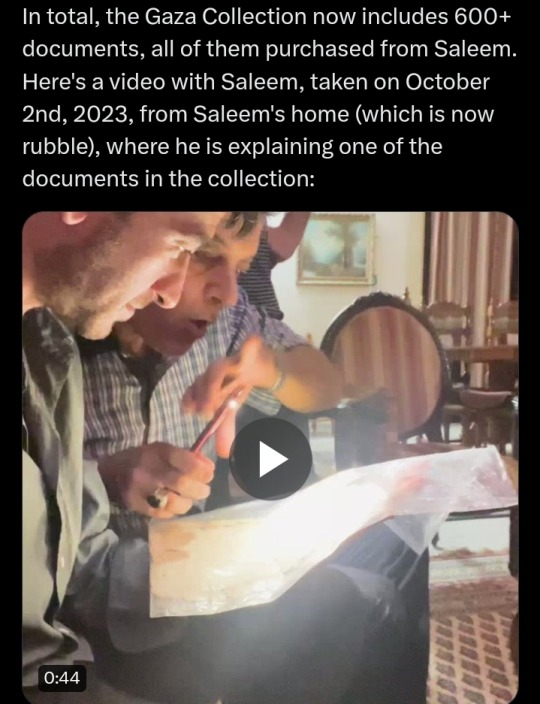
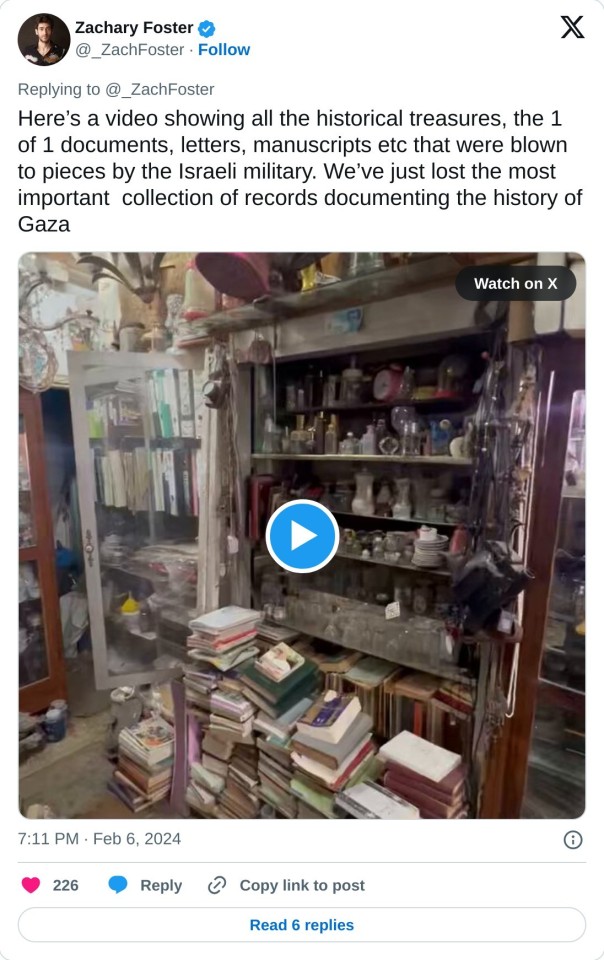
You can find the 600+ documents here. Help preserve Palestinian history
8K notes
·
View notes
Text
Effective Study Strategies for UPSC Sociology Optional Online Classes

October 30, 2024
The sociology optional online classes can be hugely beneficial to you if you ever master it for the IAS, that is, with scoring potential and overlap with general studies. Of course, to fully exploit all the benefits of sociology optional online classes, the study strategy must play along with the online learning model. New to the subject or want to enhance your preparation? Here are some strategies to get the most out of your sociology optional coaching online.
Select Perfect Sociology Optional Online Classes for the Civil Service.
Then, the foundation of the study strategy demands the best coaching. The VNK IAS Academy provides outstanding sociology classes for upsc online with planned courses and comprehensive faculty and study material that are deemed the best for students willing to conquer the sociology optional subject for IAS. Choosing the right sociology optional online classes establishes that you have quality content and experienced guidance that is vital to understanding major concepts.
Read the Syllabus and Set Priorities
Understand the syllabus of sociology for UPSC. Divide it into parts wherein you will first study high-weight topics. In your sociology online classes for UPSC, prioritise topics like social structure, stratification, and social change. These topics will help you stay on track with sociology optional online classes, and you’ll know what to focus on during live classes or recorded lessons.
Plan Your Study Effectively
As you would probably be aware, online study does not come easy. You have to make a study plan incorporating the daily, weekly, and monthly goals. These are the sessions of Sociology online coaching that can be divided into small chunks to be read daily. Schedule a specific time for the reading, noting down, and revision so you are not flooded. Take advantage of the positive impacts of the best sociology optional coaching online for yourself, play difficult sessions again and learn according to your pace.
Note-Making and Good Revisions
The best method through which students of social online UPSC Classes retain all the information learned is note-making. Summarise essential ideas formed upon the discussions held in the lectures in your note. Any important notes or tips given by lecturers should be put in the notes during lectures. Almost all the study materials provided by VNK IAS Academy are downloadable but personal note-making helps retain information in memory. Do great revisions of the same
Answer Writing Practice with the Help of Sociology Online Coaching for UPSC Mains
One of the major ingredients of success in the UPSC exam is to acquire the art of answer writing. In sociology online tutoring for IAS preparation, normally, practice happens based on previous years’ papers and is done regularly as performance analysis along with getting feedback from your tutors, which will help you grasp in principle how to structure answers effectively in the main exam.
Group Discussions
The self-paced nature of the best sociology optional coaching online can easily be supplemented by participation in group discussions with others and/or student forums. VNK IAS Academy will offer access to peer networks where you can discuss concepts, share notes and get new perspectives.
Most of all, to crack the sociology optional online classes, study strategies are very important. VNK IAS Academy provides excellent guidance. Following the above strategies and taking the best out of VNK IAS Academy guidance, you would be up to the mark in tackling the UPSC Sociology Paper.
0 notes
Text
#Sociology syllabus upsc#Upsc sociology syllabus#Sociology optional syllabus for upsc#Upsc mains sociology syllabus#Sociology syllabus for upsc english#Sociology optional notes#Sociology optional books#Upsc sociology optional question paper#Sociology notes download#Sociology for upsc#Best sociology teacher#Best sociology coaching#Sociology coaching in Delhi#Online sociology class#Online Optional Courses#Optional subjects for engineers#sociology classes for upsc#best coaching for sociology#sociology coaching#online upsc preparation
0 notes
Text
I do want to respond to this because I feel like some people have piled on as though I was saying the original posts were a full-blown psyop, and that's silly, and other people are getting a little hand-wringey about me calling this--and I do want to add extra emphasis here-- low-key misinformation. And given that just like "chuffed" or "nonplussed", low-key has two directly contradictory meanings, I want to emphasize that I am using it to mean "very slight".
You are absolutely correct that nothing that the posts say are directly incorrect, as such. And you are further correct when you say that things like regulatory capture and monopolistic tyranny are worse, actually, than a situation where corporations attempted--but failed--to use copyright to control what people do with media.
The reason I said something, and the reason that I used the language that I used, is that, to be blunt, I am old enough that the era of my childhood is now myth to a great many people. If I tell people that something was the case in 1996, then a lot of folks have very little to go on other than taking my word for it or going out of their way to look it up. I am constantly distressed to discover that there are several people out there who were not just born after 2000, but born after 2010. Terrible. Many such cases.
And look. A lot of things used to be better. Sure. But if I say "it was understood in the early 2000s that you could just download any music you wanted to for free off of the internet. There were tons of P2P programs to do it, and that's what you were supposed to do with them. There was a button right on limewire to do it, and most people agreed that that was a totally normal thing to do. They sold blank CDs everywhere." It would also be technically correct while, in fact, being even more wrong than these posts. The fact that Napster was sued out of existence is a pertinent thing to bring up there.
The passive voice is a slippery and treacherous little eel of a tool when it comes to describing how society works. The first poster contrasted humorously between VCRs and streaming services, and the second poster doubled down on it, leading to a pithy, catchy, and emotionally inflammatory message that sets out to say (correctly) "you have been wronged" and, likely through absolutely zero malicious intent, ends up suggesting that media companies being vicious greedy little bastards is somehow a modern invention. A recent depravity of enshittification. That everyone used to know better, including the companies. But, as we agree, it isnt, and they didn't. The move was from foiled attempts at monopoly to successful attempts, due to a combination of the erosion of property rights, the rot of regulatory capture, and a new digital frontier that didn't have nearly the same legal precedent to fall back on in the face of extremely wealthy media legal teams.
That is different. I know it's still bad. I never said it wasn't. But it's a different problem, and how to fight it, how to take action, hell, even how to feel about it, are all different. If they were venting about an ex over a bottle of wine, it wouldn't be worth the clarification. A post with thousands of notes about the history of digital copyright law and sociological altitudes about media is... again. Different. Even--I would go so far as to say especially -- when delivered in the tone of venting about an ex over a bottle of wine.
I am not on team "kids these days are just whiners, things have always been exactly this bad," I am just noting--as many people in the comments have as well- that the post as written ended up implying some truly ludicrous and ahistorical things. and it's worth noting that information consisting of emotionally inflammatory facts that lead people towards a conclusion that is not particularly accurate is bad information. One might even call it misinformation.
...in a low-key way.
“To protect their copyright, streaming sites do not allow for screenshotting of any kind.”
Hey remember VHS where you bought a box to plug into your tv and you could legally record whatever was playing and then own it for free forever
65K notes
·
View notes
Text
Magadh University Part 3 Exam Date 2019 Out!
Magadh University Part 3 Exam Date 2019 Out! Check Notice for BA, BSc, B.Com 3rd Year Schedule varsity will conduct exams in September-October.

Edit: Just In! Revised Magadh University Part 3 exam date 2019 schedule goes viral, No news yet on official website. Read more here.
Magadh University, Bodh Gaya, has announced the exam dates for 3rd year students. The notice for Magadh University Part 3 exam date 2019 for BA, B.Sc, B.Com has been put up on the university notice boards. Date of theory as well as practical exam are available.
Pictures of the exam date notice, taken by students from their notice boards, have been shared over social media. More students have come to know about their schedule this way and are now waiting for their admit cards. As per the notice, Magadh University will conduct exam for third year students in September and October. The time table is divided into three parts.
First, the university explains schedule for BA, B.Sc, B.Com part 3 Hons students. Their exams will be held on the following dates: September 21, September 23, September 24, September 25, September 26, September 27, September 28, September 30, October 01, October 03.
Exam will be held in two sittings on each day in September. First sitting will be 10 am to 1 pm, and second will be 2 pm to 5 pm. Subjects for the purpose of exam are divided into four groups namely A, B, C, D.
For BA, B.Sc, B.Com part 3 Hons students, group A subjects are physics, history, economics, electronics, statistics, LSW, rural economics, buddhist studies, public administration, music. Whereas group B subjects are political science, mathematics, sociology. Then group C subjects comprise of botany, zoology, commerce, psychology, home science, AI and AS, philosophy, chemistry. Finally the group D subjects are geography, hindi, english, urdu, maghi, arabic, maithili, pali, persian, bengali, bhojpuri, prakrit, sanskrit.
The second part of the exam date notice is about BA, B.Sc, B.Com part 3 general exam. Exam dates for these programs are: September 21, September 23, September 24, September 25, September 26, September 27, September 28, September 30, October 01. The same sittings, first and second, will apply for these programs as well.
Third part of the exam date notice is for BS, B.Sc, B.Com part 3 practical exam. Practical exams will be held from October 10 to October 14.
Admit card for the exams are expected to be issued via magadhuniversity.ac.in. Usually they are published under the download zone, where candidates can download the admit cards by name and father’s name, or registration number and roll number. Students can check with their colleges regarding the same.

Editor’s note: This news has been compiled on the basis of Magadh University Part 3 Exam Date 2019 notice shared by students. Varsity students must check with the admit card, datesheet in university or college before taking any action.
0 notes
Text
[Free eBook] Framing Finance: The Boundaries of Markets and Modern Capitalism by Alex Preda [Economics & Social History]
Framing Finance: The Boundaries of Markets and Modern Capitalism by Alex Preda, a Professor of Professions, Markets, and Technology at King's College London, is an economics and social history book, free for a limited time courtesy of publisher The University of Chicago Press.
This is their featured Free eBook of the Month for May, and is a combined economics and sociology book looking at the history of the stock market, and the changes in public perception over time as groups associated the 18th and 19th century stock exchanges in London, New York, and Paris managed to redefine finance as a data-based scientific pursuit, while manipulative speculators also emerged to take advantage of the limited understanding of this, and exploring how these and other factors contributed to the current state of the modern market and its issues, advocating for better public financial education.
Offered worldwide through the month of May, available directly from the publisher's website.
Currently free @ [the university's dedicated promo page] (https://press.uchicago.edu/books/freeEbook.html) (PDF available with download options for both Adobe Digital Editions and Readium DRM, follow instructions provided on download link page, requires newsletter signup with valid email address), and you can read more about the book on its regular catalogue page.
Description As the banking crisis and its effects on the world economy have made plain, the stock market is of colossal importance to our livelihoods. In Framing Finance, Alex Preda looks at the history of the market to figure out how we arrived at a point where investing is not only commonplace, but critical, as market fluctuations threaten our plans to send our children to college or retire comfortably.
As Preda discovers through extensive research, the public was once much more skeptical. For investing to become accepted, a deep-seated prejudice against speculation had to be overcome, and Preda reveals that over the course of the eighteenth and nineteenth centuries groups associated with stock exchanges in New York, London, and Paris managed to redefine finance as a scientific pursuit grounded in observational technology. But Preda also notes that as the financial data in which they trafficked became ever more difficult to understand, charismatic speculators emerged whose manipulations of the market undermined the benefits of widespread investment. And so, Framing Finance ends with an eye on the future, proposing a system of public financial education to counter the irrational elements that still animate the appeal of finance.
0 notes
Text
PDF/Ebook Global Problems and the Culture of Capitalism BY : Richard H. Robbins
(PDF Download) Global Problems and the Culture of Capitalism By Richard H. Robbins

Ebook PDF Global Problems and the Culture of Capitalism | EBOOK ONLINE DOWNLOAD If you want to download free Ebook, you are in the right place to download Ebook. Ebook/PDF Global Problems and the Culture of Capitalism DOWNLOAD in English is available for free here, Click on the download LINK below to download Ebook After You 2020 PDF Download in English by Jojo Moyes (Author).
Download Link : [Downlload Now] Global Problems and the Culture of Capitalism
Read More : [Read Now] Global Problems and the Culture of Capitalism
Description
NOTE: This edition features the same content as the traditional text in a convenient, three-hole-punched, loose-leaf version. Books a la Carte also offer a great value; this format costs significantly less than a new textbook. Before purchasing, check with your instructor or review your course syllabus to ensure that you select the correct ISBN. For courses in global issues and cultural anthropology. Examine the development and impact of capitalism on global systems The 7th Edition of Global Problems and the Culture of Capitalism follows the path of capitalism from its roots over 500 years ago to its current status in the world. Emerging from Western Europe and expanding to the United States and the rest of the world, capitalism and the systems that have contested it have impacted the economic, political, and social forces that dominate readers' lives. The authors draw on a variety of disciplines, including anthropology, history, economics, sociology, and more, to provide readers
0 notes
Text
(PDF) [Download] Exceptional Learners: An Introduction to Special Education BY : Daniel P. Hallahan
(PDF Download) Exceptional Learners: An Introduction to Special Education By Daniel P. Hallahan

Ebook PDF Exceptional Learners: An Introduction to Special Education | EBOOK ONLINE DOWNLOAD If you want to download free Ebook, you are in the right place to download Ebook. Ebook/PDF Exceptional Learners: An Introduction to Special Education DOWNLOAD in English is available for free here, Click on the download LINK below to download Ebook After You 2020 PDF Download in English by Jojo Moyes (Author).
Download Link : [Downlload Now] Exceptional Learners: An Introduction to Special Education
Read More : [Read Now] Exceptional Learners: An Introduction to Special Education
Description
NOTE: Used books, rentals, and purchases made outside of PearsonIf purchasing or renting from companies other than Pearson, the access codes for the Enhanced Pearson eText may not be included, may be incorrect, or may be previously redeemed. Check with the seller before completing your purchase."This access code card provides access to the new Enhanced Pearson eText" In "Exceptional Learners "by Hallahan, Kauffman, and Pullen, readers get an up-to-date introduction to the characteristics of exceptional learners and their education that emphasizes classroom practices, as well as the psychological, sociological, and medical aspects of disabilities and giftedness. Based on the author's premise that professionals working with exceptional learners need to develop not only a solid base of knowledge, but also a healthy attitude toward their work and the people whom they serve, this book is designed to reach the heart as well as the mind. It asks both general and special educators to
0 notes
Text
BA Sociology Semester Notes | Kashmir University Study Material
BA Sociology Semester Notes | Kashmir University Study Material
Kashmir University BA Sociology Semester Notes Download notes and solutions for the subject of Sociology here at our web portal. The students studying various PG & UG courses can download BA Sociology Semester Notes from this web post. The Sociology notes for semesters Ist, 2nd, 3rd, 4th, 5th and 6th semesters being taught at Kashmir University can be accessed from the links given in the…

View On WordPress
#Ba sociology notes of kashmir university#Kashmir 6th semester sociology notes#Kashmir university 4th semester notes of sociology#KU 5th sem sociology notes#Sociology 2nd semester kashmir university notes#Sociology 3rd semester notes pdf#Sociology Ist semester notes download
0 notes
Note
the post you reblogged about Mendeley made me think: do you have any other tips for university students that everyone should know about? i’m about to start studying sociology soon so i need all the tips i can get!
first of all that’s exciting and i wish you all the best! i’ll try to mention the basics (i feel like you might know some of this stuff but it can’t hurt to mention)
first things first as you already saw DO NOT CITE MANUALLY i mean this this is the most important thing. Mendeley is my favorite app, it has a word plugin and can cite in whichever style you want. also while talking about mendeley - SORT the papers you have in folders and sub folders and write down little notes like why you downloaded the paper. you’ll thank yourself later
equally as important DO NOT PAY FOR PAPERS ever. no author gets any money from it, it all goes to the publishers who are loaded already (counterintuitively, it costs money to publish your work). 💖scihub💖 is your best friend NEVER pay for article access i can’t stress this enough. (no link for scihub as the domain changes every so often, just google it and the wiki page stays updated on which domain is currently working). also don’t buy books unless you really want the physical edition as most books can be found online
in searching for relevant literature i much prefer pubmed to google scholar (though that’s 100% a better option than just a google search, you get more relevant results in a much shorter time period)
if you’re writing a paper and need to find the papers cited in it/the papers that cite it connected papers is SO useful and saves so much time
if you want to see if the journal/author of the paper is relevant in the field use webofscience (you can only use it once you have a uni email address/password but it’s rly useful for info/stats on a lot of things)
when writing a paper grammarly is seriously so useful. even the free version helps a lot, but the paid version is great bc it offers plagiarism checks etc. word’s thesaurus is also great for finding synonyms etc but don’t trust word too much
also, just from personal experience, most of what you need from a paper is in the abstract and discussion. when i started uni i made the mistake of reading the entire thing and it just took so much unnecessary time and energy. unless you’re focusing on that individual paper you truly do not need to read more than that (and take a look at the figures from the results; and the introduction if you’re not familiar with the topic)
#hmm idk if i have any more these are just the ones i thought of immediately#i might rb this later and add more stuff if i think of it#it’s already rly long though hdksjdkd but the biggest things are definitely scihub and mendeley/zotero#they’re like essentials i can’t do my work without but the rest are all rly useful too#hope this helps and good luck!
24 notes
·
View notes